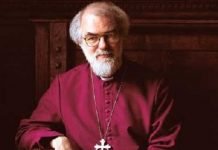Todd Atkinson, former bishop of the Via Apostolica Missionary District, has been removed from ordained ministry following the conclusion of his ecclesiastical trial.
On April 3, 2024, it was announced that Atkinson was found guilty upon clear and convincing evidence by the Anglican Church in North America’s Court for the Trial of a Bishop on four charges of “conduct giving just cause for scandal or offense, including the abuse of ecclesiastical power” (Canon IV.2.4):
Charge I: Inappropriate Relationships with Women
Charge II: Interfering in Marriage and Family Relationships
Charge III: Inappropriate Interactions with Minor Females
Charge IV: Abuse of Ecclesiastical Power Through Patterns of Manipulation and Control
The Appeal
An appeal of a final Order by the Court for the Trial of a Bishop can be made in writing to the Presiding Officer of the Anglican Church in North America’s Provincial Tribunal within 30 days of that Order (Canon IV.5.5). Atkinson attempted to appeal the Order on May 7, 2024, five days after the canonical deadline. His appeal was dismissed by the Tribunal as being untimely filed, and the case moved on to sentencing by the College of Bishops.
The Sentence
According to Canon IV.8.2 it is the responsibility of the College of Bishops to impose a sentence when a bishop is found guilty of an ecclesiastical charge. The possible sentences provided in Canon IV.8.3 are:
- Censure and/or admonishment;
- Suspension, for a definite period, not to exceed five years;
- Suspension for life; or
- Deposition from the sacred ministry.
Meeting on May 9, 2024, the College of Bishops voted to depose Todd Atkinson from the sacred ministry. His holy orders have been removed, and he is no longer permitted to engage in ordained ministry as a deacon, a priest, or a bishop.
Grieved by what they had read in the Court’s findings, the Bishops wrote and sent a letter to the victims.
The Court’s Order can be found here. It is standard procedure that the courts of the Anglican Church in North America publish their final orders. There are a number of important reasons to do so. First, it demonstrates the integrity and effectiveness of our ecclesial justice system (Proverbs 21:3, Ephesians 5:11). Second, it provides an opportunity for church members and church leaders to learn (Ephesians 5:15-17, I Timothy 5:24). Third, in the event of a conviction of misconduct, it serves as a warning to others (I Corinthians 5:12, Ephesians 5:8-13, I Timothy 5:20). Fourth, when applicable, it gives a voice to victims (Proverbs 31:8-9).
Archbishop Foley Beach commented:
“I want to take this moment to thank those who courageously came forward. Working for justice often entails risk, and scores of people willingly took that risk when they participated in the investigation and judicial process. As a Church, we are indebted to you.
Dear Church, please join me in praying for all involved. Pray that the victims and the congregational community will find restoration and healing. Pray that the guilty will choose true repentance. Pray that the lessons from these events will contribute to the building of safer churches and communities.”



